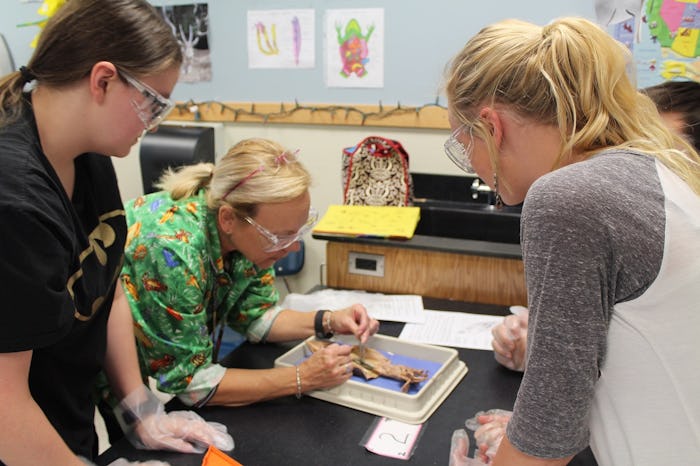As a former teacher and a huge public education advocate, I'm a big fan of teachers. I know the enormous impact teachers can have on their student’s lives, for better and, sometimes, for worse. That's why it's so important that teachers consider their words and actions carefully. This applies to everything teachers do, and especially when they’re talking to students about themselves. For instance, there are certain things teachers should never say about a kid's weight, namely anything at all.
Teacher folk: Unless you have decided to switch careers and become a pediatrician before reading the rest of this, there really aren't many legitimate, organic reasons for you to even be discussing a kid’s weight. Perhaps if you're teaching a lesson about gravity, and how it differs on different planets, there can be a fun opportunity to compare their weight on Earth versus Mars or something like that. But if you're going to do that, please be sensitive to the fact that kids are getting a lot of negative messages about what weight means, so you should prepare some body positive things to say to kids if and when students start comparing themselves to their peers. Those messages will be useful under any other circumstances where weight may come up, so taking a few moments to learn what it means to be body positive is a helpful thing to do, anyway.
If weight comes up in the classroom, whether because of something in the curriculum or because of students’ chatter in their free time, teachers should help students understand that weight doesn't mean anything about anyone’s moral character or anything else about them as a person. They should help students recognize that weight is even limited in how much it can indicate about a person's health. Especially now that addressing bullying and harassment in schools is a major focus, it's important that teachers avoid doing anything that could fuel one of the most common topics kids get bullied over: their weight. If you're a teacher, the next time you have the opportunity to comment on a student’s weight, please remember to never say the following:
Anything. Just Don’t Say Anything.
If you're trying to help students understand that weight doesn't define a person, you never actually need to comment on any specific child’s weight to do that.
Seriously, Just Don't
Compliments about weight can often trigger unhealthy behavior in order to keep getting that attention. Insults are obviously problematic, because they're insults, and teachers shouldn't insult students. So, you know, just don't say anything about it.
No, Really, Keep Your Mouth Shut On The Topic
Even if you're a Health or Physical Education teacher, you still have no place to talk to kids about their weight. Having a background in a tangentially-related subject is not the same as being qualified or informed enough about any given student to have anything useful to say to them about their weight.
Truly, Teachers Commenting On Weight Should Not Be A Thing
If you think a child’s physical appearance indicates something about their fitness for an activity, you may very well be wrong about that, anyway. However, if you want to talk to them about the activity, focus on the specific skills involved and figure out if they have any interest in or aptitude for those skills. Their weight and appearance tell you little (read: nothing) about whether they can do something, so it's irrelevant to the conversation.
It's None Of Your Business
You aren't with this child all the time. You don't know what their personal history is, or their family's lifestyle, or genetics or medical history or anything. There's no basis on which you can make a useful comment on their weight.
You Have Nothing Helpful To Say On This Subject
See also: "It's none of your business." If you don't know anything about how this child came to be this weight, you're just giving them an uninformed opinion that they may take unduly seriously because you hold a position of trust and authority. That could lead them to make unhealthy decisions down the line, regardless of whether you say something positive or negative about their weight. Just don't do it.
There Are No Upsides To This. Please, Just Don't.
For real, the impact will be either null or negative even if you think you're giving a compliment. At best, it's a wasted opportunity to talk about something more important. At worst, you're telling a kid who may have lost weight or gained weight (because they're sick or hurt or otherwise struggling) that their weight and appearance matters more than their health and well-being.
Nope
There are so many other things to talk about, and the school day often feels rushed and packed anyway. With limited time to talk to each student, why spend any of it on something like their weight?
Don't Do It
Teachers should be dedicated to developing the life of their students’ minds, and helping them grow into thoughtful, well-informed members of the community. Weight has nothing to do with any of that.
Like, Truly. Don't Do It.
The potential for shaming and any of a number of other negative outcomes from what you think is a simple comment is so high, for so little benefit. If a student is struggling with weight issues because they are at either extreme of the weight distribution, or because it's changing a lot, you're not saying anything to them they haven't heard before everywhere else they go. Don't be another aggravating voice in the crowd. Just say nothing.
You Have Many Other Useful Things To Contribute And This Really Isn't Among Them
Teachers’ words matter. Students and families often regard teachers as experts, so teachers’ opinions about kids can make a huge impact on how they see themselves. Use that influence to help kids see themselves as thinkers, problem-solvers, creators, and world-changers. Don't use it to foster unhealthy relationships with the scale.
